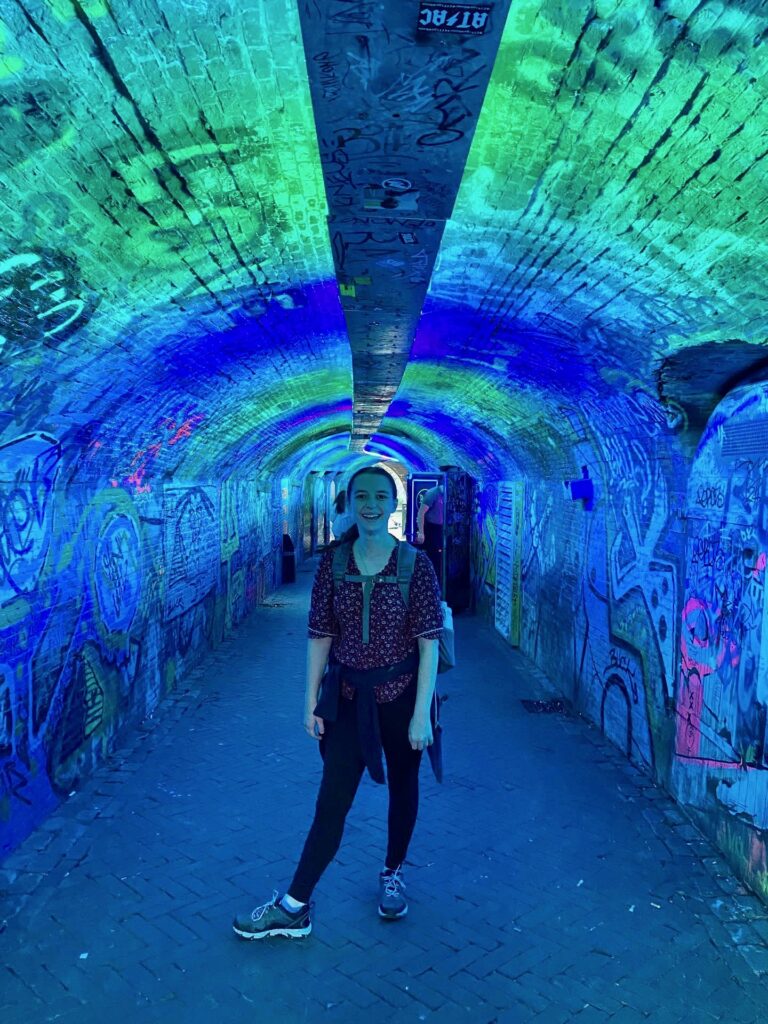Bryn Healy studied in the Netherlands and is currently pursuing a Masters degree in Ireland. Bryn personally has a rare neurological pain syndrome called Chronic Regional Pain Syndrome. Her project will consist of a website and Instagram providing information on European universities with extensive disability supports.
Introduce yourself. Share information on your disability, and your academic/career interests.
My name is Bryn Healy (she/her). I am currently a postgraduate student at University College Dublin (Leinster, Ireland) completing my Master of Science in Disability Studies. I have a Bachelor of Arts in Sociology and Politics, magna cum laude, from Mount Holyoke College (MA, US).
I am physically disabled, with a history of CRPS, hypermobility, and joint laxity; and am Autistic. I also have misophonia, a sensory processing disorder where certain sounds can cause physical pain or a flight response. I have been passionate about advocacy, particularly disability justice, from a young age and plan to turn my passion into my profession, aided by my Masters degree.
[Visual Description: I am a 23-year old white woman with brown hair and brown eyes.]
Describe your international education experience.
Along with completing my Masters degree abroad in Ireland, I also studied abroad for a semester (4 months) during my undergrad at the University of Maastricht (Netherlands). I completed the Center for European Studies Politics, Law & International Relations in Europe Program.
What was the biggest challenge that you encountered?
The biggest challenge I encountered was navigating a different university structure. European universities also expect students to do a lot more on their own and do not provide the same disability accommodations as US universities. When I have encountered issues or had to self-advocate, the person or role I would turn to in the US did not exist or would not be available to meet for weeks. I had to build my own network of institutional support through research and asking a lot of questions.
Describe your top three gains from your exchange experience.
This is a difficult question to answer. I gained a lot from my exchange experience and enjoyed it so much I decided to do it again. From my semester abroad, I learned a lot about myself. As an Autistic person, change can be very difficult. I more than just have comfort in having the same routine every morning – I need to have the same routine. However, I learned that I can adapt wherever I am to meet my support needs. I gained so many incredible memories of my travels. I learned how to budget travel and navigate student discounts. During my semester abroad, I visited 10 countries. Thus far in my postgrad, I have gone to six different countries. I also met some amazing people in my programs and personal travels. I try to absorb as much as I can out of every moment I have in a new culture or location. I believe that the more we learn about each other and one another’s histories, the better and more well-rounded we become as people and as a society.
Is there anything about your exchange experience that you would have done differently?
During my undergraduate exchange experience, I wish I had reviewed the exchange program’s disability accommodations and policies. I went purely based upon Mount Holyoke College’s study abroad advisor’s recommendation and incorrectly assumed the program would be equipped to meet my needs since I had expressed those needs to the MHC advisor. For this reason, I researched the laws and health policies in Ireland and worked to procure disability accessible accommodation that was in walking distance to my lectures. If I could do the start of my postgrad again, I would just go in person to the disability services rather than take their (apparently inaccurate) word via email that they were not present for the first two weeks of classes.
How did your disability impact or not impact your experience? Did you have to request any support, or take any steps to manage your disability while abroad?
CW: ableism
My disabilities have definitely impacted my experiences. I had to be a strong self-advocate and try to build relationships with support staff. For example, the University of Maastricht study abroad program told me that they could not inform me of the exact location of my provided accommodation nor the location of classes. This resulted in me being placed in an accommodation that was not disability accessible, oddly in the back of a medical facility, and required a 15+ min walk to actually exit the building. The housing was also not near my lectures and the unreliable bus network meant that I had no consistent way to get to classes. I had to push for over a month after I had already arrived to get moved to accessible accommodation.
I also experienced discrimination from school staff and ended up having to drop a class because of it. Another school staffer told me that it must be so hard being disabled and asked if I had thought about euthanizing myself. When I reported it to one member of staff, I was told that that was Dutch humour. Because I had worked and found a study abroad staff member that I had a great connection with and considered an ally, I also informed her and she properly escalated the comment. She was able to connect me with an Autistic student group at the University College and a disabled student group. These were great sources of community and connection during my four months.
The Access to Exchange Externship Is a Program of the National Clearinghouse on Disability and Exchange. NCDE is a project of the U.S. Department of State’s Bureau of Educational and Cultural Affairs, designed to increase the participation of people with disabilities in all kinds of international exchanges between the United States and other countries, and is supported in its implementation by Mobility International USA.
